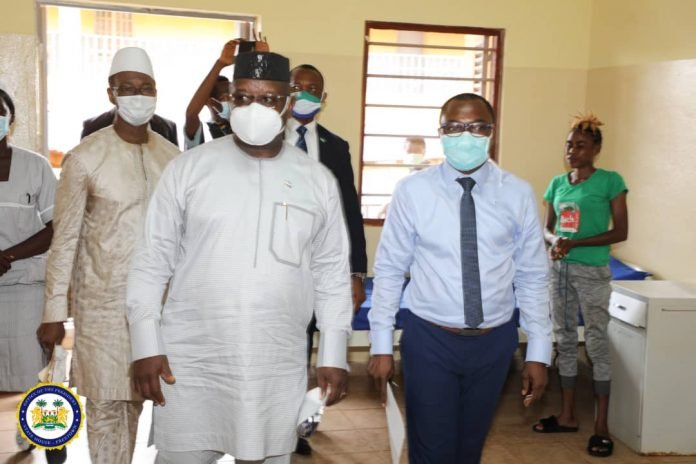By Amin Kef Sesay
At the commissioning ceremony of the renovated Sierra Leone Psychiatric Teaching Hospital (SLPTH) Complex at Kissy in Freetown on Thursday 4 June 2020 President Bio registered that mental health intervention is within his Government’s overarching human capital development priority.
“Here is why all this matters. Our country has been bludgeoned over the last three decades by traumatic event after traumatic event – from the bloody violence and chaos of the civil war, to catastrophic natural disasters like the mudslide and flooding, through the Ebola virus disease epidemic, and now the COVID-19 pandemic.
“All these events and beyond have induced conditions from post-traumatic stress disorder and grief, to anxiety, depression, psychosis, acute stress, and harmful substance abuse. Combine this with autism, epilepsy, bipolar and psychotic disorders, intellectual and cognitive disabilities, and more, and we recognise that as a nation, we must act now. We must invest heavily in mental healthcare.
“We believe, as a Government, in harnessing the full potential of every Sierra Leonean. We believe that improving and promoting mental health care is an essential part of achieving Universal Health Care coverage with positive outcomes for the physical health of our citizens,” he stated.
He also added that they believe that elevated investments in mental healthcare would have positive implications for human and socio-economic development in the country because it would protect human rights and reduce social and economic disparities.
“In our 2018 manifesto, we committed to ‘developmental health treatment and care facilities in Freetown and build new facilities in the provinces’. We made our commitment against the background of decades of neglect of mental health care and the premier psychiatric hospital in the country.
“This was an unsanitary site of unspeakable neglect and abuse. Nothing seemed to work- from ramshackle buildings with broken toilets, broken windows, empty pharmacies, no water supply, to insecure perimeter fencing that was regularly breached by patients. Mental health care was still offered within an out-dated century-old mental health legislation and evidence abounds of inhumane isolation and chaining practices and overall poor outcomes for patients. This institutional neglect was complicated with little to no dedication to staff training or to modernising mental healthcare practices. For us, the burden of doing little to nothing hung on our conscience like a millstone.
“So, the argument to make is simple. We know that persons with mental health needs and their families, in cases, are subjected to severe discrimination, stigma, harassment, and victimisation. Their constitutional rights and their security are not guaranteed. Because of cultural insensitivities, children are often not educated and abandoned to a life of vagrancy, abuse, and early death. They are also susceptible to other chronic physical disease conditions, unhealthy diets, unsafe living conditions, and most often, early death,” he said, adding that Government’s commitment remain not only to guarantee the rights of every citizen, but also to protect and nurture every citizen to their fullest potential.
The President noted what other speakers had said before him, highlighting initiatives the leadership of the SLPTH had undertaken, and the collaboration with the Ministry of Health and Sanitation, with support from partners, and the professional services of Dr. George Eze, who was singled out in Dr. Jalloh’s statement for his profound impact.
He emphasized that professional membership organizations and efforts by the United Nations Office on Drugs and Crime to designate the hospital in Freetown as a Centre for International Collaboration and Research are highly commendable.
“My Government, through the Ministry of Health and Sanitation will also pursue the ECOWAS Commission’s agreement to establish the first drug treatment and rehabilitation centre here in Sierra Leone. My Government is ready to support and promote the SLPTH in its mission to deliver quality care to its patients. In order to augment and support the training of an indigenous medical workforce, my Government fully supports the establishment of a separate Department of Psychiatry in the College of Medicine and Allied Health Sciences to train mental health professionals such as nurses, occupational therapists, addiction specialists, and more from diploma to postgraduate levels,” he assured.
Minister of Health and Sanitation, Professor Alpha Tejan Wurie, said that the event was special because it reflected the preparedness of the Government and, in particular, President Bio to take leadership in starting the process to destigmatise mental health. He added that mental health is key in achieving universal health coverage.
Executive Director for Partners in Health, working on access to quality health care, John Lascher, said that the facility was a pragmatic example of how nongovernmental organisations could partner effectively with Government and the people of Sierra Leone. He added that Sierra Leoneans should be proud of the response and leadership in the COVID-19 fight.
Psychiatrist-in-Charge, Dr Abdul Jalloh, said that the hospital is the face of mental health in the country, established in 1820 for recaptives and those with physical and mental illness. He said that with support from the Government, Partners in Health and other organisations, they had improved on services of the hospital in line with international best practices. He also encouraged the Government to establish a separate department of psychiatry in the College of Medicine and Allied Health Sciences to produce homegrown specialized staff.




